



In order to systematize this gained knowledge, students write and present some theoretical papers that are based on literature analysis; as well as take part in group discussions on the reading material.
This condition of training refers to an independent type of work, meaning that the students are themselves responsible for organizing this process.
Within the summer school framework, one can converse with colleagues, try out specific tools of various psychotherapeutic approaches, dive deep into the creative teaching process, advance one's own qualifications.
Goals of this didactic supervision are emotional support, aid in becoming and developing a professional identity, burnout prevention, solving processual challenges, formation of professional resilience.
Specialization training lasts two years.
The cost of one semester in the basic program in Gestalt psychotherapy — 1250 euro
All the material offered by the teaching staff in the seminars, is considered to be their unique technology and intellectual property. In case of an online part of the course, students would receive additional material (presentation, bibliography for personal review).
During the training, ONLY a lengthy Gestalt self-therapy shall be counted (50 hours), and only when the whole thing is done with one psychotherapist, because the given frame of work is a fundamental part of the whole educational process.
These qualities are impossible to develop outside of the group framework.
Searching for clients is the responsibility of the psychotherapist themselves.
The only exception is module 1, corresponding to the preparatory level of the program (personal gestalt psychotherapy), which is open to people with any higher education.
An academic break after second, third, fourth or fifth modules is possible no longer than one year.
The presence of all six certificates is a condition for obtaining the Baltic Institute for Psychotherapy certificate, validating successful completion of the program; this gives the right to being accredited in the professional associations and confirmation of status of Gestalt psychotherapist (LGTA) and specialist in Gestalt psychotherapy (LPB).
Content of the educational program is compliant with the educational standards with the European Association for Gestalt Therapy (EAGT) and takes into account the requirements to this profession in Latvia.
At the end of any specialization, a certificate is presented, validating the completion of the program. This certificate is an attachment to the main professional diploma, being proof of their professional development and enhancement of their professional abilities.
Gestalt psychotherapy
5 year program
1600 hours
6 modules
in accordance with 5 levels of learning
preparatory
Personal psychotherapy
initial
Theory of gestalt psychotherapy
intermediate
Methodology in gestalt psychotherapy
advanced
Clinical aspects in gestalt psychotherapy; gestalt psychotherapy profiles
highest
Supervision
-
preparatory
Personal psychotherapy
-
initial
Theory of gestalt psychotherapy
-
intermediate
Methodology in gestalt psychotherapy
-
advanced
Clinical aspects in gestalt psychotherapy; gestalt psychotherapy profiles
-
highest
Supervision
in group
individually
-
Personal gestalt psychotherapy
150 hin group
100 hindividually
-
Theory and methodology in gestalt psychotherapy
600 hin group
-
Supervision
100 hin group
50 hindividually
-
Clinical internship
400 hindividually
-
Participation in professional conferences, congresses and intensive programs
150 hindividually
-
Seminars with similar direction to gestalt psychotherapy
50 hin group
- History and development of Gestalt psychotherapy
- Theoretical basis for Gestalt psychotherapy: field theory; phenomenology; theory of self, contact cycle, contact boundary, contact cycle interruption; creative adaptiveness; psychotherapeutic process.
- Systematic understanding of the profession. General psychotherapy model. Phenomena in psychotherapeutic relations.
- Contemporary trends in psychotherapy research, applicable to Gestalt psychotherapy. Thematic research, comparative methods, self report methods.
- Gestalt psychotherapy techniques: the experiment, art-therapy, psychotherapeutic metaphors, working with dreams, dialog.
- Gestalt and body oriented approach.
- Gestalt approach in working with crises and traumas.
- Clinical aspects: general psychopathology, DSM-V, principles of analytic diagnostics in Gestalt psychotherapy.
- Gestalt psychotherapy and working with dependencies.
- Applicable fields: Gestalt psychotherapy in working with children, with families and couples, with groups, with organizations.

Tatjana Velenta-Grinina
doctor of psychology (PhD), professional psychotherapist, Gestalt psychotherapist, supervisor, head of the Baltic Institute for Psychotherapy.
Training in the program for Gestalt psychotherapy presumes the sequential passage of six modules: one is preparatory and the other five didactic. After successfully passing each of the modules a certificate is granted.
Together, these certificates are the proof of successfully ending the psychotherapeutic training and are reinforced by the main certificate of the Baltic Institute for Psychotherapy, granting the right to apply and gain accreditation by the professional associations in order for confirming the status of Gestalt psychotherapist (LGTA) and psychotherapy specialist (LPB).


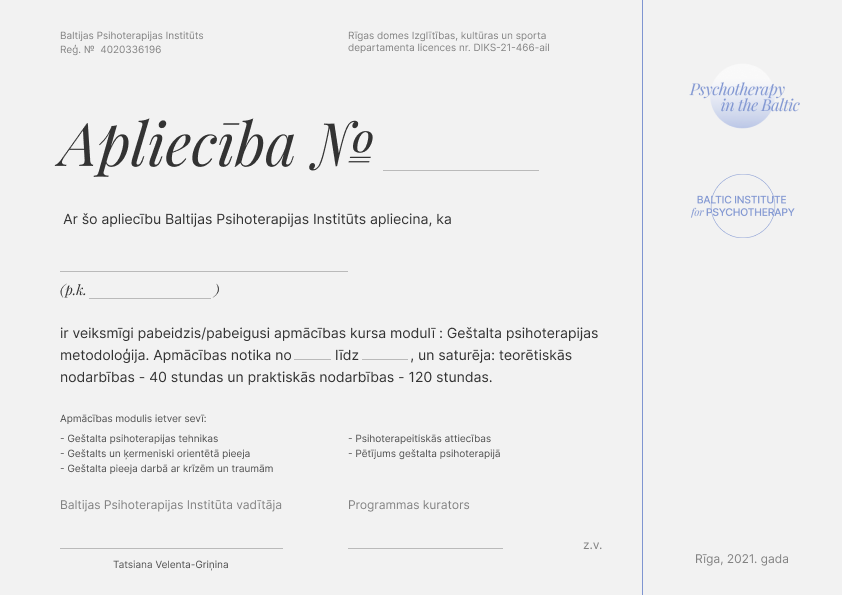
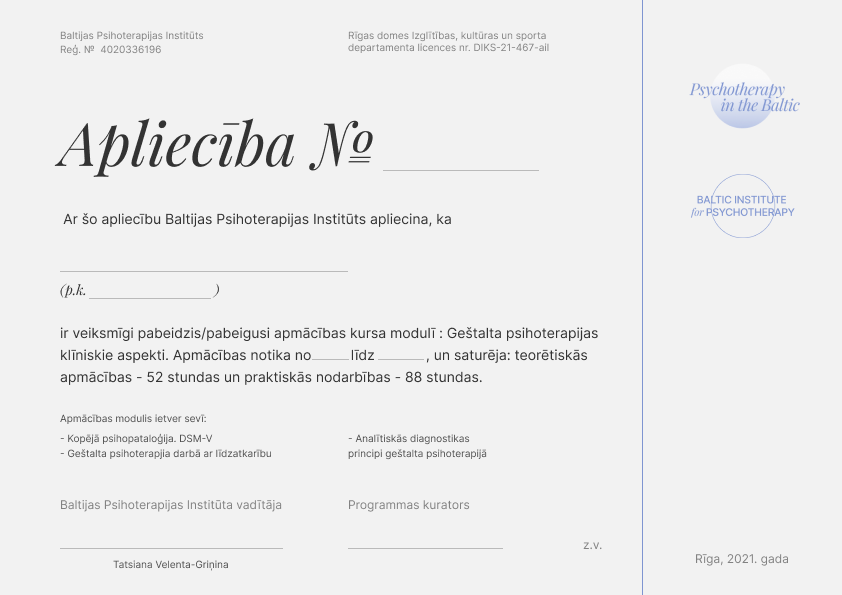
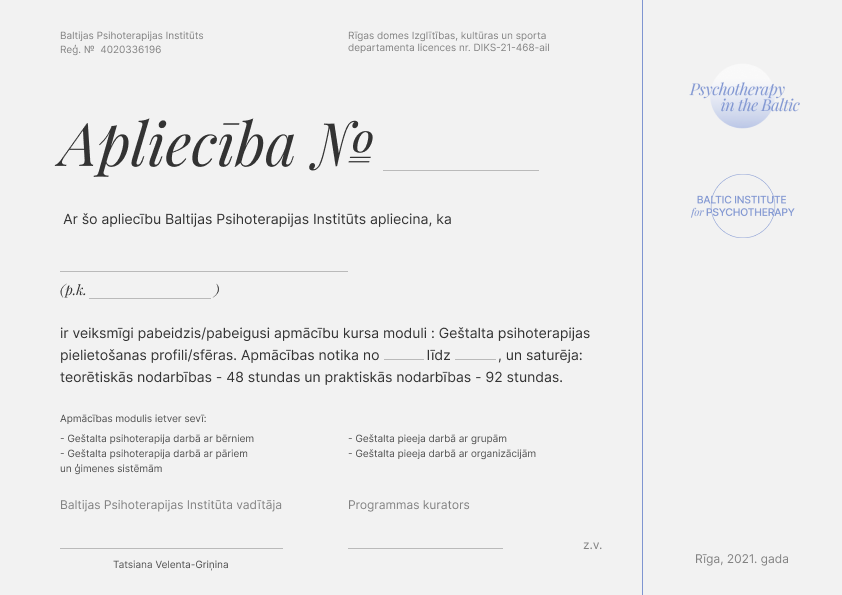
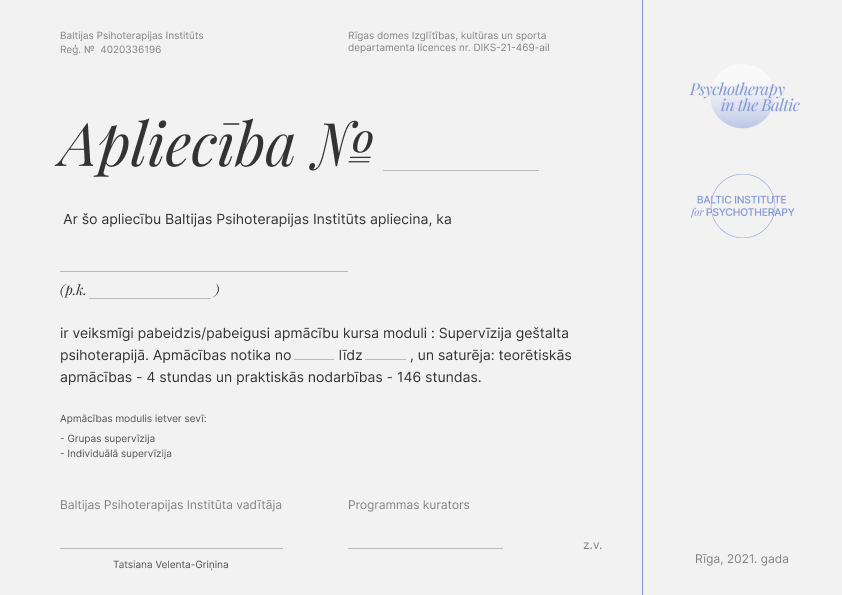

Read success stories
1. Application form (sent by the administrator upon request)
2. Motivation letter
3. A copy of the diploma of higher education (social and humanitarian, not lower than bachelor)
4. Copies of certificates of vocational training / retraining (if such certificates exist)
Payment is carried out twice per year, at each semester
The cost of one semester of the preparatory module in Gestalt psychotherapy — 1000 euro
The cost of one semester in the basic program in Gestalt psychotherapy — 1250 euro
Integrative approach in psychotherapy
2 year program
320 hours
2 educational modules
theory
of integrative approach
practical aspect
of integrative approach
-
theory
of integrative approach
-
practical aspect
of integrative approach
-
Theory and methodology of leading psychotherapy modalities
120 h
-
Group reflection: methodology of integration
25 h
-
Workshops in various psychotherapy modalities
60 h
-
Workshops for the integration of psychotherapy methods and techniques
80 h
-
Group supervision
35 h
-
Practical scientific work
- Introduction to the integrative approach. Possibilities of integration on the micro and macro levels
- General model of psychotherapy as one of the forms of integrative approaches.
- Empirically supported model for professional development of a psychotherapist.
- Research in psychotherapy: from case analysis to meta-analysis. Methodology and practicum.
- Submersion into the theory and methodology of leading psychotherapy modalities: psychoanalytical approach, humanistic approach (from procedural to the focused and structural models), cognitive-behavioral psychotherapy, family systemic psychotherapy.
- Possibility for integration on creative and practical levels (both in group and individual formats).
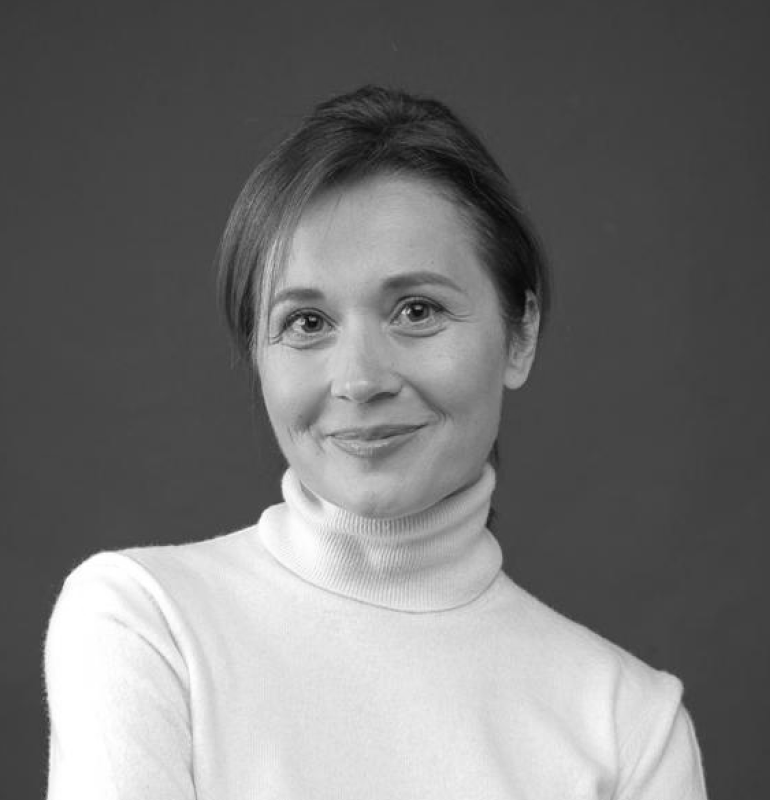
Evgenija Karlin
doctor of psychotherapy science (research doctorate at the SFU), master of psychology.
At the end of the program, a certificate of specialization is issued “Integrative approach in psychotherapy”.
The given certificate is an addition to the main diploma and is a way of confirming professional development of the specialist.


Read success stories
1. Application form (sent by the administrator upon request)
2. A copy of the diploma of higher education (social and humanitarian, not lower than bachelor)
3. Copies of certificates of vocational training / retraining (if such certificates exist)
4. Experience in personal psychotherapy (individual and / or group in any of the directions)
5. Motivational letter
Payment is carried out twice per year, at each semester
The cost of one semester in the specialization “Integrated approach in psychotherapy” — 1600 euro
Couples Psychotherapy integrative approach
2 year program
270 hours
2 modules
introduction
to couples psychotherapy
specialized topics of couples psychotherapy
psychotherapy of family crises
-
introduction
to couples psychotherapy
-
specialized topics of couples psychotherapy
psychotherapy of family crises
in group
individually
-
Theory and methodology of couples psychotherapy
120 hin group
-
Practical workshops to improve technical skills
25 hin group
-
Supervision
40 hindividually
10 hin group
-
Practical works
- History and development of couples psychotherapy: from the structural approach to emotion-focused psychotherapy. Rules and principles in working as a family (couples) psychotherapist.
- Multi-leveled model of functioning in a family system, as a base for the integrative approach in couples psychotherapy. The focus of psychotherapy when working on different levels of family functioning (individual level, micro, macro and mega-systems).
- Partnership subsystem: characteristics, goals and normative dynamics (the normal crises).
- Structural parameters of functioning of a couple: borders, intimacy, hierarchy, flexibility. Understanding the dysfunctional family structure.
- Historical parameters of functioning in a couple: family history, family scenario (model of the couple’s parents’ family systems), family secrets, myths, legends, norms and rules, rituals and values.
- Procedural parameters of functioning of a couple: communication.
- Useful concepts in couples therapy: choice of partner, differentiation of the ‘I’, emotional triangles (M. Bowen), sibling position (W. K. Toman); couple interaction style (complementary and symmetrical models), balance in ‘giving-receiving’ relations.
- Relationship-specific factors: intimacy (sexual, emotional, cognitive, esthetical); expectations and satisfaction of needs (both reality and infantile expectations / fantasies).
- Abnormal crises: infidelity, divorce, illness, death, job loss, migration, etc.
- Stages of the psychotherapeutic process. First interview with the couple. Psychotherapeutic contract. Duration of psychotherapy. Methods and techniques for accompanying couples at different psychotherapeutic stages. Methodology of homework.
- Circular interview. Psychotherapeutic hypotheses. Systemic thinking of a couples therapist.
- Emotions-focused model of psychotherapy as an effective instrument in raising emotional closeness and safety in couples.
- Schema therapy resources in work with couples.
- Psychotherapeutic group for couples as a factor in relationship development and working out acute crises.

Tatjana Velenta-Grinina
doctor of psychology (PhD), professional psychotherapist, Gestalt psychotherapist, supervisor, head of the Baltic Institute for Psychotherapy.
At the end of the program, a certificate is granted for the completion of “Couples Psychotherapy: integrative approach”.
The given certificate is an addition to the main diploma and is a form of confirming the professional development of the specialist.

Read success stories
1. Application form (sent by the administrator upon request)
2. A copy of the diploma of higher education (social and humanitarian, not lower than bachelor)
3. Copies of certificates of vocational training / retraining (if such certificates exist)
4. Experience in personal psychotherapy (individual and / or group in any of the directions)
5. Motivational letter
Payment is carried out twice per year, at each semester
The cost of one semester in the specialization “Couples psychotherapy: integrative approach” — 1450 euro
Children and adolescent psychotherapy: integrative approach
2 year program
320 hours
2 modules
basic course
master’s course
basic course
master’s course
in group
individually
-
Theory and methodology of children and adolescent psychotherapy
125 hin group
-
Supervision
60 hin group
10 hindividually
-
Personal psychotherapy: working out own childhood experiences
10 hindividually
-
Workshops improving technical skills
115 hin group
-
Practical works
- History and development of child and adolescent psychotherapy. Rules and work principles of a child psychologist. The difference between child psychotherapy and adult one. Setting up the working space.
- Therapeutic process. Work strategy choice: development, consulting, psychotherapy, deep psychotherapy. Usage of different tactics in working with children: complex analysis; strengthening the child’s self; solving social issues; development of creative adaptiveness; reactiveness; forming relationships.
- Focuses of psychotherapeutic interventions: child, parents, social surrounding, social institutions.
- Child as the participant of psychotherapeutic process (context and background). Theory of psychosexual development (S. Freud). Theory of separation-individuation (M. Mahler).
- Family influence on the child’s forming a self-identity. Attachment theory. Parents’ and family's role in the child’s psychotherapy.
- Stages of psychotherapeutic process: precontact, contacting, full contact, postcontact.
- Working with children and their family going through high stress situations: divorce, second marriage, appearance of another child within the family, loss, adaptation to new conditions (moving, inclusion into educational system, etc.)
- Anger and aggression, concept differentiation. Theory of aggression development. Types of aggression. Age-related manifestation of aggression. Manifesting anger. Interior picture of an ‘angry’ child. Reasons for anger manifestation in children. Working with anger: diagnostics; reaction to it; teaching the socially acceptable ways of expressing it; working out fears and guilt feelings; development of self-control; developing the picture of self; building self confidence.
- Fears. Manifestation of children's fears. Standard fears. A holistic view on reasons for children’s fears. Main stages in working with children who experience fears. Methods for overcoming children’s fears.
- Crises and traumas. Normative and non-normative crises. Forming psychotherapeutic work with children and adolescents: strategy choice, creating particular work conditions, considering psychological resistance, coping and healing.
- Loss. Types of loss. Features of experience of loss in children. Painful reactions to loss. The tasks of coping with loss. Psychotherapy with children who experience loss.

Anastasia Schapel
master of psychology, child psychologist, Gestalt psychotherapist
Studying in this program will make it possible to get a holistic view on organization of working with children and adolescents in families. It shall make it possible to learn more than 20 methods in working with children and adolescents. Make it possible to develop diagnostic skills and assimilate the knowledge in working with projective techniques. Научится анализу детских работ и самосупервизии. To see a family as a system, a role of a child within the family system and the family role within the manifestations of the child. To learn to offer consultations for the parents and to build joint meetings. To independently create own techniques in working with children and adolescents.
At the end of the program, a certificate is granted for the completion of “Child and adolescent psychotherapy: integrative approach”. The given certificate is an addition to the main diploma and is a form of confirming the professional development of the specialist.

Read success stories
1. Application form (sent by the administrator upon request)
2. A copy of the diploma of higher education (social and humanitarian, not lower than bachelor)
3. Copies of certificates of vocational training / retraining (if such certificates exist)
4. Experience in personal psychotherapy (individual and / or group in any of the directions)
5. Motivational letter
Payment is carried out twice per year, at each semester
The cost of one semester in the specialization “Children and adolescent psychotherapy: integrative approach” — 1450 euro